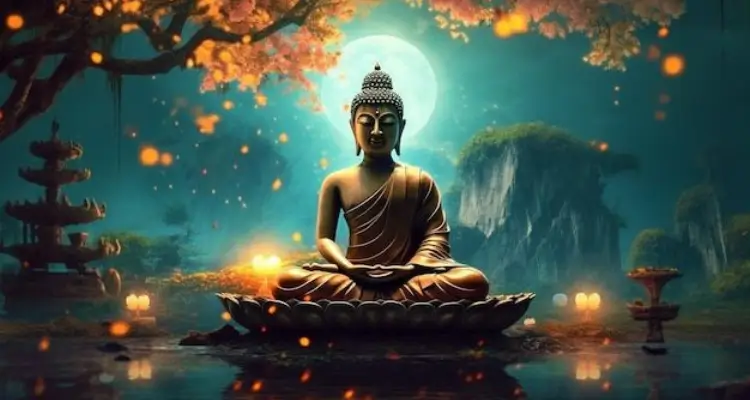We live in an era defined by technological advancements, global connectivity, and a fast-paced lifestyle. Despite the many benefits these transformations bring, anxiety has become one of the most significant mental health challenges of the 21st century. Millions of people face its effects daily, impacting not only emotional well-being but also physical health and quality of life.
In Buddhism, emotions such as anxiety are perceived differently compared to Western approaches. While modern psychology often treats anxiety as a disorder to be managed, Buddhism views it as part of a broader human experience, deeply tied to desire, attachment, and ignorance. This perspective offers an alternative way to understand and address anxiety.
This article aims to examine why anxiety is so prevalent in today’s world, through the lens of Buddhist teachings. By delving into key factors such as insatiable desire, impermanence, and attachment, we’ll explore how these elements shape the way we experience anxiety.
Furthermore, we will discuss how Buddhism provides practical and spiritual tools to effectively confront this condition. From meditation practices to the cultivation of inner values, Buddhist teachings offer a unique and timeless approach to help individuals find peace in an increasingly chaotic world.
The Causes of Anxiety in the Modern World
Anxiety in the modern world is driven by various factors that shape how we live and interact with our surroundings. These factors are deeply tied to the fast-paced nature of contemporary society, excessive reliance on technology, and the lack of a higher purpose that transcends material pursuits.
The culture of haste is one of the main causes of anxiety. We live in a world where time is constantly viewed as a scarce resource, and productivity is celebrated as the ultimate virtue. This mindset pushes us into exhausting work routines, constant multitasking, and a persistent feeling that we’re never doing enough. In Buddhism, this relentless pursuit of doing more and being more is seen as a reflection of attachment and the inherent dissatisfaction of the human condition.
Another significant factor is the disconnected connection facilitated by technology and social media. While these tools have the potential to connect us globally, they also create constant comparisons, unrealistic expectations, and a cycle of external validation. Studies show that excessive social media use can heighten feelings of loneliness and anxiety. In Buddhism, the practice of mindfulness is a way to counter this issue, helping us redirect our focus to the present moment and reduce the impact of digital distractions.
Lastly, the lack of purpose is a central issue, especially in a society that values material success above all else. Buddhism teaches that the pursuit of wealth, status, or external recognition is inherently unsatisfying and often leads to suffering. Anxiety arises when we try to fill the inner void with external achievements. The path to overcoming this, according to Buddhism, is to cultivate a higher purpose rooted in compassion, self-awareness, and acceptance of impermanence.
The Role of Desire and Attachment in Anxiety
In Buddhism, desire and attachment are identified as central causes of human suffering, and they play a significant role in the development of anxiety. These concepts help us understand how our aspirations and expectations often trap us in a cycle of dissatisfaction and restlessness.
Insatiable desire is one of the primary drivers of anxiety, according to Buddhism. The relentless pursuit of “more”—whether in material possessions, personal achievements, or social status—creates a constant sense of lack. Even after achieving a goal, the desire for something new and greater quickly replaces it. This chronic dissatisfaction, described in Buddhism as “tanha” (craving), generates anxiety as we fear losing what we have or failing to obtain what we seek.
Another significant factor is attachment to expectations. We often create unrealistic ideals about how life, people, and ourselves “should” be. This attachment to specific outcomes or high standards places immense pressure on our actions and thoughts. When reality inevitably diverges from these expectations, we experience frustration and anxiety. Buddhism teaches the practice of accepting the present moment and letting go of attachments to predetermined outcomes as a path to emotional freedom.
Finally, the cycle of suffering links attachment to impermanence. In Buddhism, impermanence (anicca) is a universal truth: everything changes, and nothing is permanent. However, attachment makes us resist this reality, leading us to struggle against inevitable changes and fear the future. This resistance creates a spiral of anxiety and suffering. Buddhist practice encourages us to contemplate impermanence not as a threat but as an invitation to live more presently and with less attachment.
The Buddhist Perspective on Managing Anxiety
In Buddhism, anxiety is seen as a reflection of our resistance to the natural flow of life and our struggle to deal with uncertainty. Through profound teachings, this philosophy offers practices that foster acceptance, balance, and inner peace.
One of its core principles is acceptance of impermanence. Buddhism teaches that everything in life is constantly changing, and resisting this natural flow creates suffering. By embracing impermanence, we begin to see changes and challenges as inevitable parts of existence rather than threats. This perspective significantly reduces fear of the future and the anxiety associated with it, allowing us to live with greater serenity.
The practice of mindfulness is another powerful tool for combating anxiety. By focusing on the present moment, we avoid the mental habit of reliving the past or fearing the future. Mindfulness teaches us to observe our thoughts and emotions without judgment, creating an inner space of calm and clarity that helps us face challenging situations more consciously.
Additionally, Buddhism emphasizes cultivating compassion and equanimity. Compassion encourages us to treat ourselves and others with kindness and understanding, especially during difficult times. Equanimity helps us develop a balanced mind that remains steady in the face of adversity. This combination strengthens our emotional resilience and empowers us to handle anxiety in a healthier and more transformative way.
Buddhist Practices to Reduce Anxiety
Buddhism offers a set of practices that help reduce anxiety by fostering emotional balance and mental clarity. These practices are rooted in simple yet powerful principles that can be integrated into daily life.
Zazen meditation, one of the most well-known forms of Buddhist meditation, is a practice focused on mindfulness and being present in the moment. During Zazen, practitioners sit in silence, concentrating on their breathing and observing thoughts as they arise without clinging to them. This helps calm the mind and reduce anxious thoughts, bringing a sense of serenity and emotional control.
The practice of letting go is another essential tool. In Buddhism, excessive attachment to ideas, outcomes, and unrealistic expectations is seen as a source of suffering. Learning to release the need for control and idealizations can relieve internal pressure, creating space to accept life as it is. This does not mean passivity but rather a healthy balance between action and acceptance.
Finally, the cultivation of inner values is key to finding inner peace. Buddhism teaches that true happiness and contentment come from within, not from external factors. By focusing on developing qualities like gratitude, compassion, and self-understanding, we reduce our dependence on external circumstances for emotional well-being. This practice strengthens resilience and helps navigate challenges with greater ease.
The Positive Impact of Buddhism on Mental Health
Buddhism offers a unique approach to transforming the relationship with anxiety and promoting mental well-being. With teachings that focus on self-awareness and mindfulness practices, Buddhist philosophy provides profound and practical solutions for the emotional challenges of modern life.
Transforming anxiety is one of the most notable benefits. Instead of fighting or suppressing anxiety, Buddhist principles teach us to observe it with acceptance and curiosity. Through practices like meditation and mindfulness, it’s possible to reduce the intensity of anxiety and reshape how we perceive it, turning it into a path for personal growth.
Another significant impact is achieving balance between the material and the spiritual. In the chaos of modern life, where the pursuit of success and constant pressure for results dominate, Buddhism emphasizes the importance of nurturing the spirit and finding harmony. Practices like letting go and reflecting on impermanence help manage life’s uncertainties with greater calmness, fostering balance and mental clarity.
Real-life examples of transformation highlight the power of Buddhism. Individuals who have integrated Buddhist teachings into their lives report profound changes, such as reduced anxiety and enhanced inner peace. From stressed-out CEOs to anxious students, many have found Buddhism to be a valuable tool for overcoming emotional challenges and living more balanced lives.
Conclusion
Anxiety, one of the greatest challenges of modern life, has deep roots in the fast pace of life, the insatiable desire for more, and attachment to unrealistic expectations. Buddhism offers a practical and effective approach to addressing these issues, providing a deeper understanding of the causes of anxiety and tools to transform it into a path of growth and balance.
With teachings such as accepting impermanence, cultivating mindfulness, and practicing detachment, Buddhism not only addresses the symptoms of anxiety but also tackles its underlying causes. By applying these practices in daily life, it’s possible to find greater peace and clarity amidst the uncertainties of the modern world.
I invite you to explore Buddhism as a path to overcoming anxiety. Regardless of your previous experience with spiritual practices, Buddhist teachings are accessible and can be tailored to your needs. It’s an invitation to self-discovery and personal transformation.
To begin, I suggest taking small steps, such as dedicating a few minutes each day to meditation or mindfulness. These simple actions can be the start of a meaningful journey to incorporate Buddhism into your life, helping to reduce anxiety and cultivate a deeper state of well-being.

































